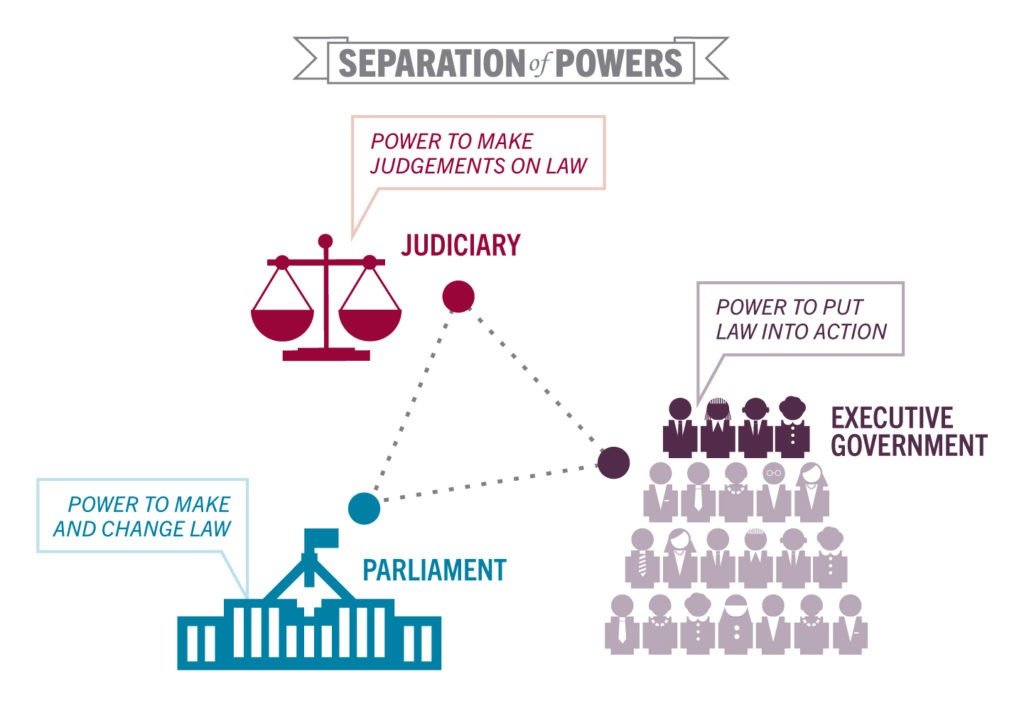If the rule of law by Dicey affected the growth of Administrative law in Britain. The doctrine of ‘Separation of Powers’ had an intimate impact on the development of administrative law in the United States.’
Though the doctrine of Separation of Powers is traceable to Aristotle, but the writings of Locke and Montesquieu gave it a base on which modern attempts to distinguish between legislative, executive and judicial power is grounded.
- Locke distinguished between what he called:
- Discontinuous legislative power- included the general rule-making power called into action from time to time and not continuously.
- Continuous executive power- includes all those powers which we now call executive and judicial.
- Federative power- the power of conducting foreign affairs.
MEANING
- According to the theory of separation of powers, the three powers and functions of the government must, in free democracy, always be kept separate and exercised by three separate organs of the government.
PROBLEM
- Each organ while performing its activities tends to interfere in the sphere of working of another functionary because a strict demarcation of functions is not possible in their dealings with the general public. Thus, even when acting in ambit of their own power, overlapping functions tend to appear amongst these organs.
QUESTION WHICH MIGHT COME IN MIND?
- The question which assumes significance over here is that what should be the relation among these three organs of the state?
- Whether there should be complete separation of powers or there should be co-ordination among them?
HISTORICAL BACKGROUND
- The doctrine of separation of powers has emerged in several forms at different periods. Its origin is traceable to Plato and Aristotle.
- In the 16th and 17th centuries, French philosopher John Bodin and British politician Locke expressed their views about the theory.
- In the 18th century there was complete and full-fledged monarchy in France. Louis XIV was well known for his absolute and autocratic powers. The king and his administration were acting arbitrarily. The subject had no right and liberty at all.
- On the other hand Montesquieu was very impressed by the liberal thoughts of Locke.
- It was Montesquieu who for the first time formulated this doctrine systematically, scientifically and clearly in his book Esprit des Lois (The Spirit of Laws) published in the year 1748.
MONTESQUIEU’S DOCTRINE
- Montesquieu, a French scholar, found that concentration of power in one person or a group of persons results in tyranny. And therefore for decentralization of power to check arbitrariness, he felt the need for vesting the governmental power in three different organs, the legislature, the executive, and the judiciary. The principle implies that each organ should be independent of the other and that no organ should perform functions that belong to the other.
‘Miserable indeed would be the case, were the same man or the same body, whether of the nobles or of the people, to exercise those three powers, that of enacting laws, that of executing the public resolutions, and that of judging the crimes or differences of individuals.’
- The importance of the doctrine lies in the fact that it seeks to preserve the human liberty by avoiding concentration of powers in one person or body of persons.
- According to Wade and Phillips the doctrine of separation of powers implies:
- The same person should not form more than one organ of the Government.
- One organ of the Government should not exercise the function of other organs of the Government.
- One organ of the Government should not encroach with the function of the other two organs of the Government.
EFFECT
- It had tremendous impact on the development of administrative law and functioning of governments. It was appreciated by English and American jurists and accepted by politicians.
- The Constituent Assembly of France in 1789 declared that there would be nothing like a Constitution in the country where the doctrine of separation of powers was not accepted.
IMPORTANCE
- Checks and balance
- Government of law rather than that of the officials
- Independence of judiciary
An independent Judiciary is an indispensable requisite of a free society under the rule of law. Such independence implies freedom from interference by the Executive or the Legislature with the exercise of judicial function.



